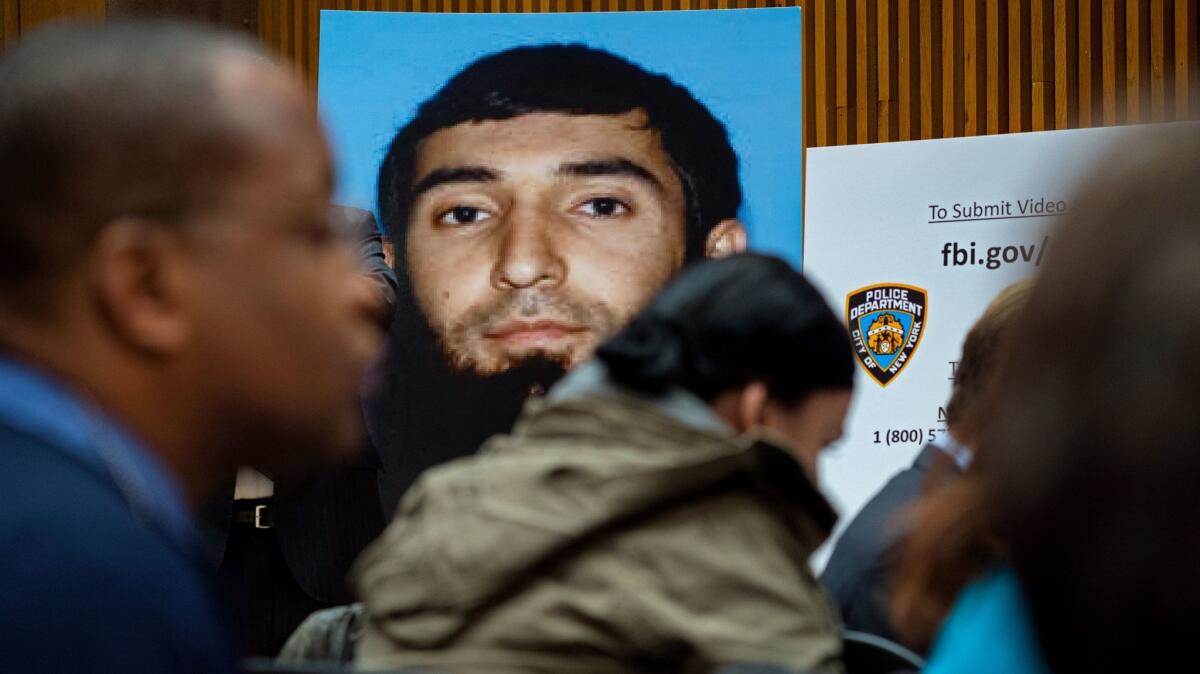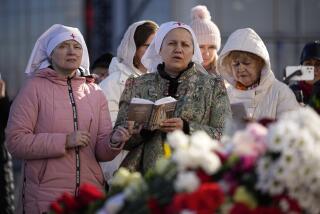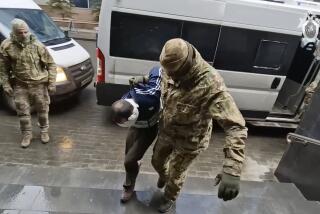A snapshot of Uzbekistan, homeland of the suspect in the deadly New York truck attack

The suspect in this week’s deadly truck attack in New York, Sayfullo Saipov, came to the United States from Uzbekistan, a Central Asian country and former Soviet republic, apparently seeking a better life.
The country, which has faced years of economic stagnation, relies on remittances from those who go abroad to help families make ends meet, but also has seen militant movements grow from political and religious conflict.
In Saipov’s case, authorities said it appears radicalization came a year ago in the U.S., not Uzbekistan, from watching Islamic State videos on his cellphone. Investigators found 90 videos and 3,800 images related to Islamic State on his phone, according to court documents.
Authorities said Saipov, 29, claimed that he carried out the attack “in the name of” Islamic State and that “he felt good about what he had done.” He faces federal charges of supporting Islamic State extremists and vehicular violence in the Tuesday attack, which left eight people dead and 12 injured.
Authorities say Islamic State is among several extremist groups that attract people with roots in a number of countries. Here’s some background on Uzbekistan.
Have people from Uzbekistan been involved in attacks before?
In 2015, prosecutors in New York arrested three men, including two citizens of Uzbekistan, for trying to join Islamic State and carry out attacks in the US.
Akhror Saidakhmetov, 19, an immigrant from Kazakhstan who worked at a cellphone repair store, and Abdurasul Hasanovich Juraboev, 24, an immigrant from Uzbekistan who worked in a restaurant, both had obtained permanent resident status in the US. In August, Abror Habibov, 30, an immigrant from Uzbekistan, pleaded guilty to charges he worked with the pair to plan attacks in the U.S., including trying to kill President Obama, and raising funds to travel to Syria to join Islamic State. All three were active on an Uzbek-language online forum affiliated with Islamic State.
While that plot did not go forward, several deadly attacks in Europe have been attributed to Islamic State members from Central Asia.
Prosecutors in Turkey are currently trying Abdulkadir Masharipov, a citizen of Uzbekistan who allegedly saw combat in Afghanistan and Syria, for the killing of 39 revelers at a nightclub in Istanbul on Dec. 31, 2016. Masharipov was allegedly part of a network of Islamic State members from former Soviet countries that was also responsible for a June 2016 attack on Istanbul’s Ataturk International Airport that killed 45 people.
The perpetrators in the Istanbul attack were in direct contact with Islamic State in Syria and had received combat training for such operations.
“We don’t know the facts about Saipov,” said Nate Schenkkan, a researcher with Freedom House who monitors democratic governance in Central Asia. “Maybe he was just someone who was disaffected, or angry, and became meshed in narratives of vengeance, of violence, and simply acted them out according to a template advanced to anyone with an internet connection who wants to read it.”
Why did Saipov come to the U.S.?
Saipov, who reportedly had no history of problems with Uzbek authorities, appears to have immigrated to the U.S. for economic reasons, which is increasingly common in Uzbekistan. He entered the U.S. legally in 2010 and worked as a trucker and Uber driver.
Decades of corruption have stagnated Uzbekistan’s economy, making it one of the poorest countries in the region and highly dependent on remittances from those working abroad, which account for around half of the country’s gross domestic product.
“Economically it’s a desperate and terrible situation. It’s hard to work there and hard to make money,” Schenkkan said. “There are very well-established diaspora networks, in Turkey, in Russia, in Kazakhstan, so many people go to work and send money back. There was nothing strange about Saipov, about a guy at this age going abroad to work.”
Why is Central Asia, and especially Uzbekistan, ideologically important for Islamic State?
Uzbekistan, with a population of 32 million, is the most populated of five former Soviet countries that make up Central Asia. It has long served as a cultural and linguistic bridge between South Asia, the Middle East and Russia.
The Fergana Valley, the most densely populated region of Central Asia, cuts across modern-day Uzbekistan, Tajikistan, and Kyrgyzstan, and served as a cradle for Islamic empires that governed the predominantly Muslim region until the 19th century, when they lost ground to the Russian Empire and eventually became part of the Soviet Union.
When the Soviet Union dissolved in 1991, what used to be five provinces became five independent nations: Uzbekistan, Kazakhstan, Kyrgyzstan, Tajikistan, and Turkmenistan. Though the country’s names are supposed to correspond to Soviet-era ethnic classifications — Uzbek, Tajik, Kyrgyz, Kazakh, and Turkmen, respectively — it’s not always the case: for instance, about 15% of Kyrgyzstan is ethnically Uzbek.
Is Uzbekistan a breeding ground for extremism?
The country’s recent history of religious and political repression has given rise to militant movements that have been active in the Middle East and South Asia.
Uzbekistan held elections in 1991, but they were considered largely fraudulent. The former local head of the Communist Party, Islam Karimov, became president in a pattern replicated across Central Asia.
After independence, it was thought many of the most severe restrictions on religious expression imposed during Soviet rule in Uzbekistan would be lifted, but Karimov decisively put reform movements down.
In neighboring Tajikistan, a civil war erupted between Islamists and the government, drawing dissident Islamists from Uzbekistan, and providing Karimov with justification for imposing what human rights groups say were some of the most severe restrictions on religious expression in the world.
By the late 1990s, militants had formed the Islamic Movement of Uzbekistan, which called for Karimov’s overthrow and carried out a handful of attacks in the country. The group found more room to operate in neighboring Afghanistan, where it became a prominent ally of the Taliban and Al Qaeda. After the U.S. invasion of Afghanistan in 2001, much of the Islamic Movement of Uzbekistan membership was forced to move to Pakistan, and over the last 16 years some of the deadliest attacks in that country have been carried out by members of the group.
With the outbreak of the Syrian civil war in 2011, thousands of veteran militants from Central Asia found a new theater to operate in, with some becoming Islamic State’s leading commanders.
Karimov, who ruled the country until his death in 2016, oversaw one of the most repressive states in the world. More than 10,000 people are imprisoned, and torture is widespread, according to Human Rights Watch, with most prisoners accused of crimes related to religious extremism, for behavior like growing a beard, wearing a headscarf, or visiting the mosque for prayers. Tens of thousands of others are on a “black list,” said Schenkkan, and anyone seeking to leave the country must obtain an “exit visa” from the government.
President Shavkat Mirziyoyev, who succeeded Karimov after his death, has indicated the government would like to open up. This year, Uzbekistan allowed human rights monitors to return to the country after years of being banned, and pledged those on the black list would be given a chance to clear their names. A handful of prominent dissidents have returned from exile, but some have been detained on arrival.
Mirziyoyev issued a statement condemning the attack in New York City, and pledging his government would help with any investigation, but some rights groups worry the president may follow Karimov’s pattern, and use the threat of terrorist attacks to roll back or cancel planned reforms.
“Given the way the government has treated political and religious dissent, including from Islamists, for decades, it’s not like there is some other step they have been waiting to take,” Schenkkan said. “But there has been a kind of softening recently … and this could damage that. It could allow the government to question that process.”
Farooq is a special correspondent.
More to Read
Start your day right
Sign up for Essential California for news, features and recommendations from the L.A. Times and beyond in your inbox six days a week.
You may occasionally receive promotional content from the Los Angeles Times.






